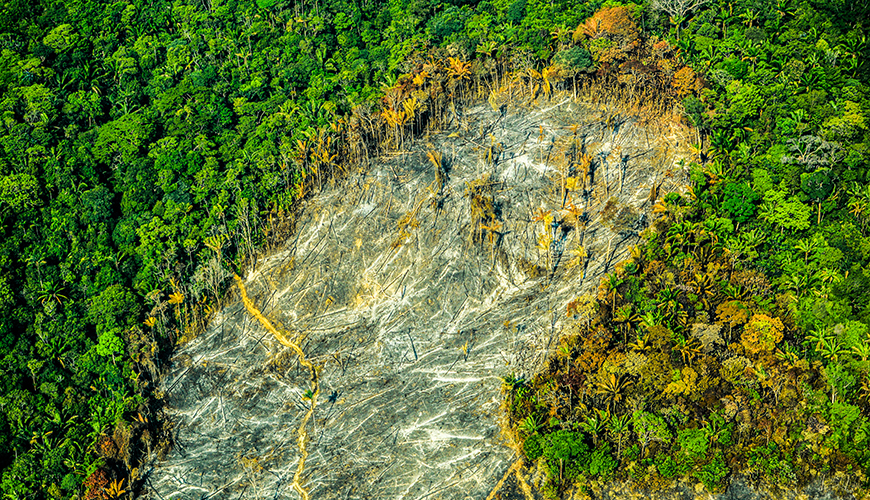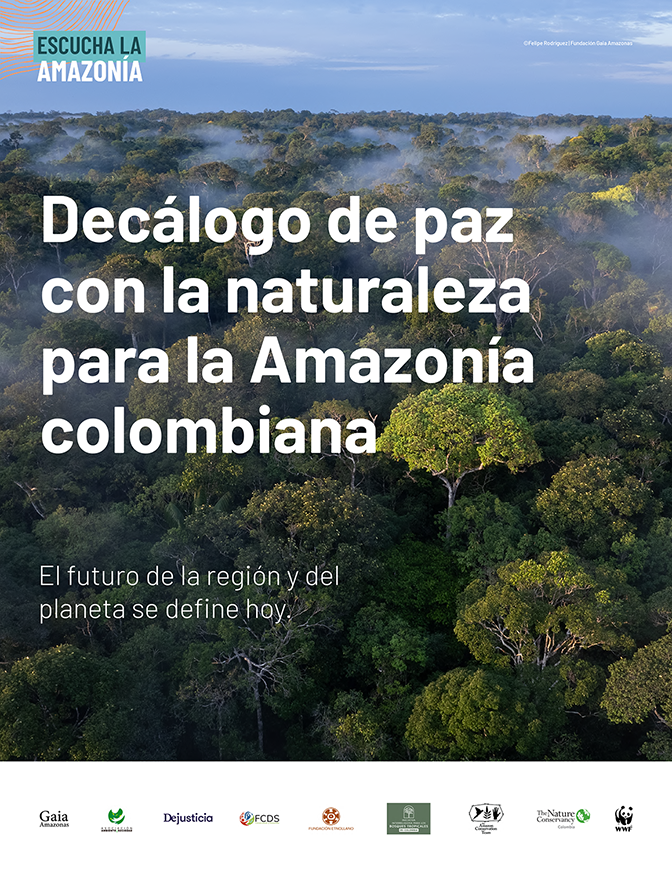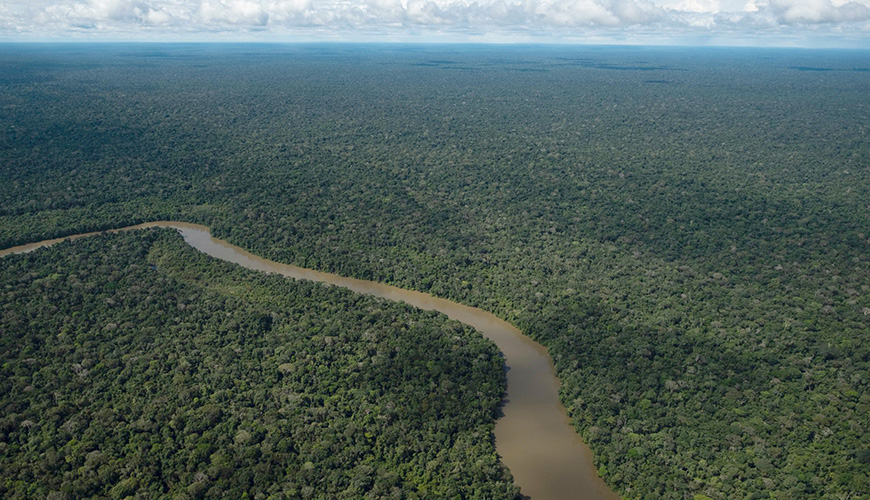By: Nudy María Oviedo*, coordinator of IRI-Cartagena del Chairá.
The Conference of the Parties (COP16) to the Convention on Biological Diversity comes at a time of unprecedented environmental urgency, coinciding with one of the biggest crises the Amazon has faced in decades. This vast tropical forest, which spans approximately 7 million square kilometers and spans nine countries, is suffering devastating impacts due to the combination of climate change and human action. The current situation in the Amazon not only threatens global climate stability, but also the survival of millions of people and species that depend on this ecosystem.
In the last year, the Amazon experienced an extreme drought that affected the entire Amazon River basin. The rivers in this region, which support the lives of more than 30 million people, reached the lowest levels recorded to date. This resulted in the death of hundreds of aquatic animals, including dolphins, a keystone species for the balance of river ecosystems. In addition, the drought devastated crops and severely hampered the mobilization of communities that depend on the river for their daily livelihoods.
Far from improving, the Amazon crisis is worsening year after year. According to the Amazon Cooperation Treaty Organization, the drought affecting the Amazon basin is tending to worsen, with increasingly severe consequences. The lack of rainfall has increased wildfires across the region, generating vast expanses of smoke that blanket the sky and choke local communities. Brazil’s Institute for Space Research recently warned that the Amazon, instead of being a source of life, is beginning to become an emitter of pollution, carrying “rivers of smoke” instead of water.

In Colombia, the outlook is no more encouraging. While the Ministry of Environment had reported a decrease in deforestation rates last year, this trend has not been maintained in 2024. Minister Susana Muhamad recently announced that deforestation has reached alarming levels in the first quarter of the year, with an increase of 40% compared to the same period in 2023. This phenomenon, which has reached a “historic peak”, is related to agricultural expansion, extensive cattle ranching and other human activities that continue to endanger the integrity of the Amazon ecosystem.
Despite these challenges, however, there are reasons to remain hopeful. Advances in the development of innovative technologies and strategies by scientific research centers are providing valuable tools to monitor, restore, and conserve the Amazon. These tools make it possible not only to curb deforestation, but also to identify sustainable practices that can harmonize the needs of local communities with environmental protection. In addition, a robust legal framework has been consolidated at the national and international levels that provides effective instruments to reduce greenhouse gas emissions and mitigate the effects of climate change.
One of the greatest factors of hope in the struggle for the Amazon are the indigenous peoples who have inhabited this region since ancient times. These communities, which have developed a deeply connected relationship with nature, have vigorously led the way in protecting their territories, cultures and spirituality. In a world where climate change and environmental degradation seem relentless, the indigenous peoples of the Amazon have demonstrated extraordinary resilience, using their traditional knowledge to defend the forest and its resources. Increasingly, it is recognized that these communities are fundamental to the preservation of Amazonian ecosystems and their biodiversity.

At the same time, global awareness of the importance of the Amazon continues to grow. Civil society is mobilizing through various international organizations and networks to support rainforest conservation. An example of this mobilization is the Interfaith Initiative for Tropical Forests (IRI), which brings together religious leaders from different traditions with the common goal of protecting forests. IRI-Colombia, as part of this initiative, has joined forces with other organizations to work on the protection of the Amazon, addressing the crisis from an ethical and moral perspective.
In this context, COP16, which will be held in Cali, offers a unique opportunity to promote concrete actions to protect the Amazon and its inhabitants. From IRI-Colombia, together with the Listen to the Amazon Alliance, we will bring a message of urgency to the political leaders and civil society present at the conference, embodied in the “Decalogue of Peace with Nature for the Amazon Region”. This document summarizes the most urgent actions that must be taken to halt deforestation, protect biodiversity, and safeguard the rights of forest-dependent communities.

The Decalogue is structured around three key pillars:
- Stop deforestation: It is crucial to develop ambitious programs and concrete targets that include strategies to end deforestation in the Amazon region in national biodiversity plans. The focus should be on long-term conservation and ensuring that the region’s economic development does not compromise its vital ecosystem.
- Recognize the role of local communities: Indigenous peoples and Afro-descendant and peasant communities have been the historical guardians of the Amazon. It is essential to recognize and protect their contributions to forest conservation, as well as to guarantee their territorial and cultural rights. The protection of the Amazon cannot be separated from the protection of the people who inhabit it.
- Promote climate change mitigation and biodiversity conservation: It is urgent to advance in the implementation of mechanisms that strengthen the sustainable management of natural resources and promote an effective reduction of greenhouse gas emissions. These mechanisms must be aligned with international commitments in the fight against climate change.
In addition to these pillars, the Decalogue highlights the need for a territorial planning model that guarantees the human rights of indigenous communities and that articulates an inclusive governance of territories. It is also essential to strengthen environmental education policy at the national level, so that future generations understand the importance of the Amazon in the context of climate change and global conservation.
Collaboration between faith communities and environmental organizations is key to building a powerful alliance that addresses the Amazon crisis from a comprehensive perspective. Religious leaders have a unique role to play, as their moral and spiritual influence can mobilize broad sectors of society. By raising awareness of the ethical importance of conservation in the Amazon, they can make the protection of this ecosystem not only an environmental, but also a moral and social priority.
COP16 in Cali, therefore, is not just a conference to discuss policies. It is an opportunity to join forces, mobilize wills and take decisive actions in defense of the Amazon. Religious and social leaders have a transformative role to play in this fight, as their voices can be a beacon of hope in a world facing unprecedented environmental challenges. The protection of the Amazon is a global imperative that requires a long-term ethical, political and social commitment.
Read here the complete Spanish edition of THE FOREST IS LIFE.


